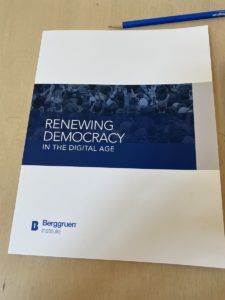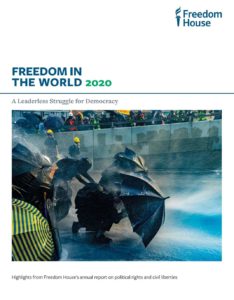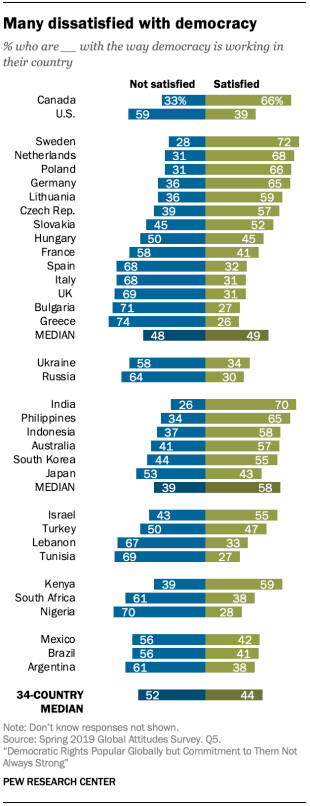 Rebuilding civic architecture, renovating democratic institutions and renewing the legitimacy of democracy will foster the resilience of societies and help preserve liberal-democratic values, according to a new analysis.
Rebuilding civic architecture, renovating democratic institutions and renewing the legitimacy of democracy will foster the resilience of societies and help preserve liberal-democratic values, according to a new analysis.
Building a new form of citizen-engaged democracy will require a series of adaptations to the current order to create new opportunities for participation and deliberation, to restore social cohesion, and to renovate the public square for the digital age, say the authors of Renewing Democracy in the Digital Age.
The report, from the Berggruen Institute Future of Democracy program, is the result of a three-year research program and related consultations on reforms that could strengthen democratic values, institutions, and outcomes. The analysis draws on the 2019 Berggruen Governance Index, which measures 27 different criteria across 38 countries. The working group addresses the challenges of Renewing Social Cohesion, Rebuilding the Public Square in the Digital Age, and Renovating Democratic Institutions.
 It’s become almost a tradition for intelligence units, think tanks and research institutes to start a new year – and this time a new decade – by summing up the state of the moment, note analysts Bruno Kaufmann and Domhnall O’Sullivan, citing the latest Freedom in the World report from Freedom House, research by scholars like Larry Diamond – co-chair of the Research Council of the International Forum for Democratic Studies of the National Endowment for Democracy (NED) – and the most recent Economist Index, in which editor Kate Hoey identifies “a demand for more popular sovereignty and better political representation, both holding out the potential for a regeneration of democracy”.
It’s become almost a tradition for intelligence units, think tanks and research institutes to start a new year – and this time a new decade – by summing up the state of the moment, note analysts Bruno Kaufmann and Domhnall O’Sullivan, citing the latest Freedom in the World report from Freedom House, research by scholars like Larry Diamond – co-chair of the Research Council of the International Forum for Democratic Studies of the National Endowment for Democracy (NED) – and the most recent Economist Index, in which editor Kate Hoey identifies “a demand for more popular sovereignty and better political representation, both holding out the potential for a regeneration of democracy”.
Global reports by Varieties of Democracy (V-Dem) and International IDEA assess hundreds of criteria to the conclusion that innovation is certainly underway when it comes to democracy, they add:
 Innovative practices like “crowdlaw”, which mobilize “collective intelligence” through networked deliberation, such as the annual “Presidential Hackathon” that takes places in Taiwan under the auspices of Digital Minister Audrey Tang, as a way of setting public priorities and the agenda for both legislators and sponsors of citizens’ initiatives and referendums.
Innovative practices like “crowdlaw”, which mobilize “collective intelligence” through networked deliberation, such as the annual “Presidential Hackathon” that takes places in Taiwan under the auspices of Digital Minister Audrey Tang, as a way of setting public priorities and the agenda for both legislators and sponsors of citizens’ initiatives and referendums.- Citizen’s Assemblies, like that which took place in Ireland in 2017, which form ‘policy juries’ by bringing together randomly selected but representative groups of citizens.
- The first report of the University of Cambridge’s new Center for the Future of Democracy examines levels of dissatisfaction with democracy in 154 countries, including “islands of contentment” like Switzerland, where a wide-ranging power sharing mechanism makes citizens happier.
- Global opinion is more divided on the question of whether the state is run for the benefit of all, while people generally agree that voting gives them a say about how the government runs things in their country, researchers Richard Wike and Shannon Schumacher write in a recent Pew Center report – right).







